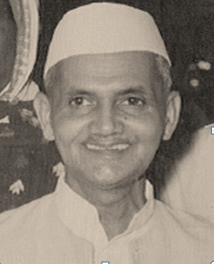Prime Minister : Continuing Nehru's Legacy but with Change
Lal Bahadur Shastri was sworn in as the second prime minister of India on June 9 , 1964. He kept with himself the portfolios of external affairs and atomic energy , though he later transferred the external affairs ministry to Swaran Singh .
In his first broadcast to the nation as prime minister , Shastri said : " There comes a time in the life of every nation when it stands at the cross - roads of history and must choose which way to go . But for us there need be no difficulty or hesitation , no looking to right or left . Our way is straight and clear the building up of a socialist democracy at home with freedom and prosperity for all , and the maintenance of world peace and friendship with all nations . "
A true secularist at heart , Shastri said : " The unique thing about our country is that we have Hindus , Muslims , Christians , Sikhs , Parsis and people of all other religions . We have temples and mosques , gurdwaras and churches . But we do not bring all this into politics . This is the difference between India and Pakistan . Whereas Pakistan proclaims herself to be an Islamic State and uses religion as a political factor , we Indians have the freedom to follow whatever religion we may choose , and worship in any way we please . So far as politics is concerned , each of us is as much an Indian as the other . "
As prime minister , Shastri retained the main ministers of Nehru's cabinet , but also drew Indira Gandhi , Nehru's daughter , into his cabinet as information and broadcasting minister . He respected Nehru and kept true to the general policies created by the first prime minister of India , but he was not a blind follower of Nehru . In several ways , he showed he had a mind of his own .
Shastri was the first prime minister to have a secretary to the prime minister when he drew upon L.K. Jha , a senior ICS officer , to advise him . He thus laid the foundation of what later took the form of the Prime Minister's Secretariat or the Prime Minister's Office .
Challenges
Shastri's short tenure saw some major developments . It also showed that Shastri was no weakling but had a vision of his own besides being capable of taking tough decisions quickly . He said : " Perhaps due to my being small in size and soft of tongue , people are apt to believe that I am not able to be very firm . Though not physically strong , I think I am internally not so weak . " The three major crises that his government faced were the violent anti - Hindi demonstrations in the state of Madras ( later to be named Tamil Nadu ) , the widespread food shortages , and the second war with Pakistan .
The country was disturbed in 1965 by major protests in the non - Hindi speaking states against the possibility of Hindi being imposed as the only national language of India . The agitation was especially intense and violent in Madras state . There were agitations by students and even riots in some places over the issue . Shastri brought peace to prevail by assuring the people that English would continue to be used as the official language as long the non - Hindi speaking states wanted , though the army had to be called in to quell riots in some places .
Economic Ideas
Though few people seem to have realised it , Lal Bahadur Shastri took some important steps to meet the challenges that faced the country , steps that were very different from Nehruvian economics .






0 Comments